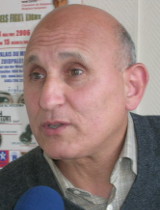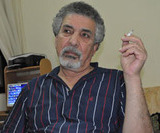Ahmed Marzouki

Ahmed Marzouki was born in 1947 in Bouajul, a village in northwest Morrocco. His father worked at the local court after having studied law at the University of Qarawiyyin.
After primary school in the neighbouring town of Ghafsai, Marzouki attended secondary schools in Fes, Rabat and Meknes. Subsequent to this, he went to the agricultural college in Meknes and finally decided for a military career, so started his formation at the military academy.
In 1969, he received the rank and became an instructor at the Royal Military School of Aharmoumou where he taught non-commissioned officers. In 1971 he was among the officers involved in the army putsch / coup d’état Skhirat. He was sentenced to five years in prison. Instead of detaining/jailing him in a regular prison, Marzouki was kidnapped along with the other jailed officers from on high and subsequently jailed in the prison of Tazmamart. Marzouki spent 18 years in total isolation there – isolated both from the world and other prisoners. 30 of the officers died from these unhuman conditions. There was no medical care, no rights for the prisoners and no human rights.
It was only after the intervention of humanitarian organizations and reports on the prison in the media that Marzouki and the other surviving prisoners were set free in 1991.
Marzouki then went back to school to get his university entrance diploma and began to study law. He graduated in 1998 and married the same year; later he became the father of three children. He wanted to work as a lawyer but did not get a licence. When it became known that he wanted to write an eyewitness report on the prison of Tazmamart, he was interrogated by the Morroccan secret service.
In the year 2000 he published his book „Tazmamart: cell No. 10“ in French (tazmamart cellule 10) and 2002 in English.
Marzouki translated “Korridor”, the book of a former fellow inmate Abdul Fattah Fakhani from French into Arabic, as well as the book ‘Guilty until their innocence is proven’ by the journalist Khalid al-Jami‘i, and a children’s book bearing the title “Mohammed Abd al-Karim al-Khattabi, Hero of the Rifatlas-Region” by the writer Zakiyya Daoud.
His second book ‘The Crisis of the Void’ appeared in 2012.
He regularly publishes articles in regional and international journals.
Books of Ahmed Marzouki
Mustafa Khalifa

Mustafa Khalifa was born in 1948 in Jarabulus near Aleppo. He grew up in Aleppo, where he participated in many political activities already as a teenager, due to which he was twice sent to prison. Upon his release form prison he studied art and film direction in France, and was arrested at Damascus airport when he returned from Paris. From 1982-1994, Khalifa was held without trial in various state security prisons, including the infamous Tadmur Military Prison.
2006 he emigrated to the United Arab Emirates, although he was banned from traveling outside Syria, and then to France, where he still lives today. He is married to the activist Sahar al-Bunni, sister of the political activists Akram and Anwar al-Bunni.
„al-Qawqa’a. Yawmiyyat mutalassis“ (The Shell. Memoirs of a Hidden Observer – Beirut: Dar al-Adab, 2008) is his first and only book.
The Shell
The Shell (Beirut: Dar al-Adab, 2008) is a gripping autobiographic novel, written in spare, stripped-down prose punctuated by introspective, poetic reflection. In it, the first-person narrator describes being apprehended by state security and the twelve years in prison that follow. He details the brutal torture at the hands of the prison guards and military police, as well as the social fabric of prison life. Early on, the protagonist tells the guards that he brought up a Christian, hoping they will understand that their accusation that he is working with the Muslim Brotherhood is clearly false. Yet with true catch-22 logic and a belief in the infallibility of Syria’s state intelligence, the guards tell him that if he has been arrested, it must be for good reason, and as a Christian accused of working for the Brotherhood, he is doubly a traitor. As a professed atheist, the protagonist is ostracized by his fellow inmates, members of the Muslim Brotherhood, who suspect he may be a spy planted among them by the state. Tortured by the guards and shunned by the other prisoners, he retreats further into himself, forming a protective shell around himself for which the book is named.
Books of Mustafa Khalifa
„al-Qawqa’a. Yawmiyyat mutalassis“ (Die Kapsel, Tagebuch eines heimlichen Beobachters – Beirut: Dar al-Adab, 2008)



